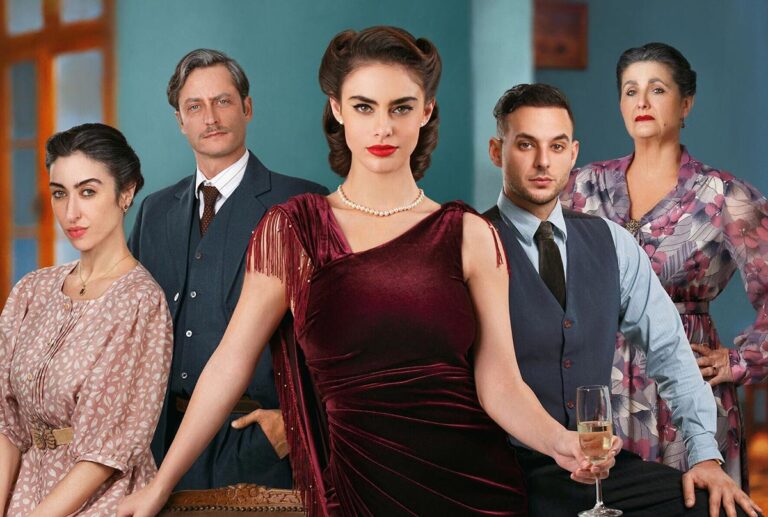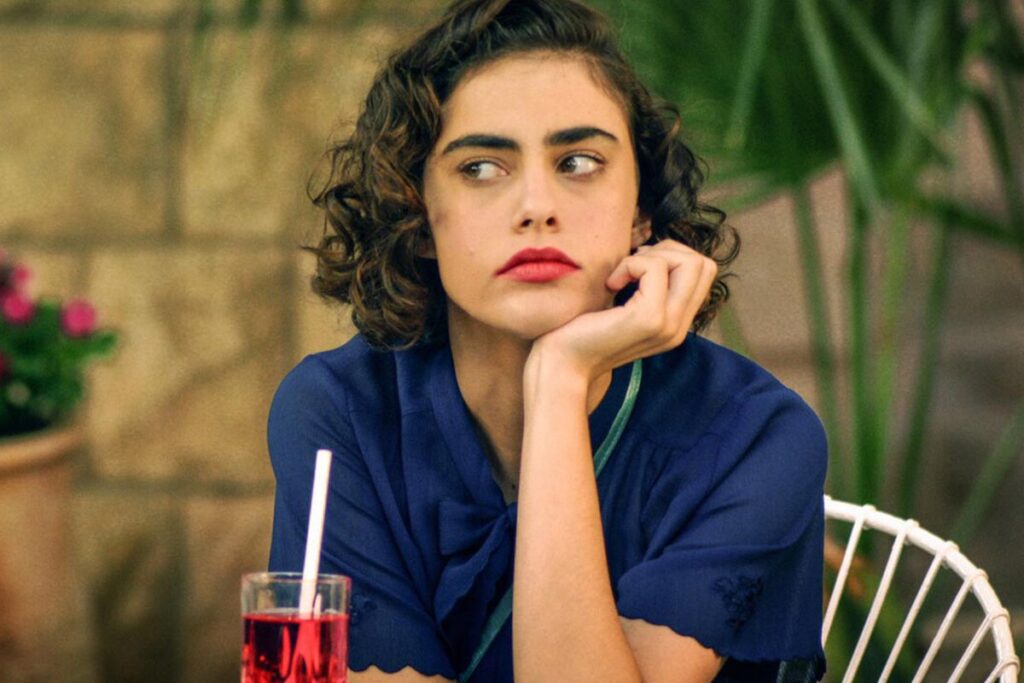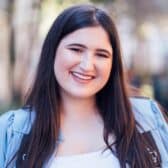
Following the release of its second season, the Israeli sensation “The Beauty Queen of Jerusalem” continues to captivate both critics and viewers worldwide.
Based on the best-selling novel by Sarit Yishai-Levi, this period drama chronicles the lives of three generations of the Sephardic Ermoza family in Jerusalem.
Set under Ottoman rule and British Mandate Palestine, the series delves into the complex romantic destinies of the Ermoza family as the characters navigate the profound societal changes unfolding in Israel. Read more: The true story behind “Beauty Queen of Jerusalem”
Unpacked recently spoke with Swell Ariel Or, who plays Luna in the series. The conversation touched on her own Jewish identity, the importance of showcasing Sephardic stories in the media, and what she hopes audiences will take away from “ Beauty Queen of Jerusalem.” Here are some of the highlights.
“Beauty Queen of Jerusalem” was Or’s first acting job

Or was only 21 when she was cast in the “Beauty Queen of Jerusalem.” While serving in the technology division of the IDF, she used her one night off per week to take an acting course with “Fauda” star Doron Ben David. This experience convinced her to pursue acting professionally.
Upon completing her army service, Or knew she didn’t want to pursue a college education and instead set her sights on the entertainment industry. Unfortunately, every agent except one rejected her on the spot.
After a year and a half of auditions, she landed her first acting gig, which, by chance, was the top billing in one of Israel’s most ambitious television projects.
Taking on a lead role in a high-profile production — and collaborating with Israel’s biggest stars like Michael Aloni and Hila Saada — was both challenging and enriching for Or.
“Acting alongside actors who I deeply admire, I was very stressed,” Or admitted. “I wanted to be good enough for them. I wanted to be a good enough partner since I’m acting in the big leagues now.”
But Or said she learned from her castmates’ expertise. They taught her efficient techniques, from nailing emotional scenes in minimal takes to quickly memorizing scripts.
“I consider the entire cast a blessing,” Or said. They helped me with everything. It’s a lot thanks to them that I managed to nail this role as my first role.”
Authentically depicting life in British Mandate Palestine
To authentically depict Luna and the era, Or delved into 1930s Hollywood films and explored the works of the era’s prominent musicians, poets, fashion luminaries, and cultural trends, especially those who were popular in the Middle East.
“I looked into what a woman’s desires in that period looked like, what the glass ceiling for women was back then and what a woman’s dreams were,” Or said. “What could she have accomplished in that time, especially in the Middle East?”
She believes that the series’ richly drawn characters allow every viewer to see a bit of themselves reflected.
“You can find a whole spectrum of humanity in the show,” Or said. “Specifically with Luna, she is a rebellious character who was born way ahead of her time, and has dreams and hopes that are not suited for the 1930s in Jerusalem.”
“A lot of us feel that way about ourselves: We have something new to say to the world and we want to be ourselves despite our family and traditions and where we’re at in the world,” she added.
To fully embody Luna, Or journaled imagined daily experiences for her character. Through this process, she aimed to deeply understand Luna’s inner thoughts and reactions to various situations.
Or hopes “Beauty Queen of Jerusalem” will pave the way for more diverse Jewish stories
Set against the backdrop of historical tensions between Sephardic and Ashkenazi Jews, as well as ongoing strife between Jews, Arabs and the British, “Beauty Queen of Jerusalem” is one of the first television shows which depicts Sephardic Jews.
The characters converse in a mix of Hebrew, English, Arabic and Ladino — a language traditionally spoken by Sephardic Jews which blends elements of Spanish and Hebrew. The once-vibrant language has now dwindled: as of 2018, reportedly only 51,000 people spoke Ladino.
Filming the show was the 23-year-old actress’ first exposure to Ladino, which she described as “beautiful.”
With the Sephardic story told in “Beauty Queen of Jerusalem,” Or believes the show is a stepping stone in presenting more diverse narratives of Jewish history in TV and film.
She received an outpouring of support from isolated Jewish communities in places like Uzbekistan and India, who hope to see their communities depicted on television, like the Sephardic community has been in “Beauty Queen of Jerusalem.”
“Finally, you have a big international show that represents Sephardic Jews,” Or said, highlighting the message she received from global communities: “Maybe there’s hope for us to be represented in the spectrum of Jewish identities too.”
Delving into the distinctions between Mizrahi and Sephardic culture
Acting in “Beauty Queen of Jerusalem” also took on a personal meaning for Or, allowing her to learn more about her own heritage.
While working on the show, Or — who is of Russian, Iraqi and Yemenite descent — delved into the intricate distinctions between Mizrahi and Sephardic Jews.
While these groups are often broadly categorized together, their unique differences are captivating, Or said.
For instance, Or noticed how the flavorful, spice-rich, traditional Sephardic cuisine resembles Mizrahi food. She also discovered how Sephardic traditions incorporate many European etiquettes and rituals. Without her role in the show and the research she did, she probably would not have learned about these subtleties.
Being of both Sephardic and Ashkenazi descent, Or found the Ashkenazi-Sephardic dynamics especially relevant. Growing up in Tel Aviv, she observed many mixed heritage families like her own.
“I’m happy to know that we have made progress in terms of the Ashkenazi-Sephardi divide within our own people. And I really hope that people will learn from that,” Or said.
Or hopes “Beauty Queen of Jerusalem” will help viewers see Israel and Israelis in a different light
Since its debut, “The Beauty Queen of Jerusalem” has earned four awards from the Israeli Television Academy and is one of the top international shows on Netflix.
Beyond resonating with the characters and enjoying the storylines, Or hopes that viewers will learn about under-discussed aspects of Israeli history through the show.
“It’s the story of the establishment of Israel from the inside,” she explained. “We hear a lot about the establishment of Israel from the outside because of the Holocaust and antisemitism, but we don’t really hear about why we had to have our own country from Jews who were already there.”
She hopes the show will paint a picture for viewers of what Israel looked like before the Holocaust, and that it will allow viewers to understand the fight for a Jewish state from the perspectives of those residing in British Mandate Palestine.
“We didn’t all come after the Holocaust in Europe. A lot of us were here before — a lot of Sephardic communities,” Or said. “Especially today, when the whole world is looking at Israel and the Middle East on social media, it’s very important to show a different part of history that isn’t widely known.”
She also hopes viewers gain insights into the early phases of Israeli international relations through the show. The series showcases Israelis interacting with the wider Middle East, from market scenes to instances of Jewish traveling to Syria and Lebanon for purchases and vacation. Or stressed that these interactions during the show’s timeframe laid the groundwork for Israel’s foreign relations.
Or wants to highlight the tremendous artistic talent in Israel
Or expressed that, as an Israeli actress, she’s motivated to use her platform to educate audiences about Israeli culture and history. Her representation of Israel on the global stage isn’t out of obligation, but is a personal ethos.
“I don’t feel obligated to represent Israel worldwide, but I do that because it’s my set of values,” she said. “I feel it is both a blessing and an honor to be able to be in a position where people want to hear my opinion, to let me show them [Israel] through my perspective.”
Whenever abroad, Or considers herself an ambassador for Israel, aiming to uplift fellow Israeli artists and spotlight their work.
Looking ahead, Or is setting her sights on Hollywood. She plans to move to Los Angeles this fall to explore opportunities in the American film world. Yet, her bond with Israel remains unshaken. One of her ambitious goals is to secure an Academy Award for her home country.
To date, Israeli-American actress Natalie Portman is the only Israeli actress to have been nominated for an Oscar, with one victory in her three attempts. Additionally, Israeli director Guy Naativ, who recently directed “Golda,” won an Academy Award in 2018 for his short film “Skin.”
Or believes that her best shot at securing an Oscar for Israel is through making her mark in Hollywood. Israeli films face challenges in gaining recognition at the Oscars, she told Jewish Insider.
“I think that an Israeli actress or actor [winning an Oscar] is the next step, and then maybe they’ll give an Israeli film a chance,” Or said. “I think that we deserve an Oscar because we have great cinema here. We have great artists and actors.
“Jewish people are historically storytellers. This is how we managed to survive the horrible things and traumas that happened to us. We’re the best at storytelling, so I think we deserve it.”
Originally Published Sep 7, 2023 12:58PM EDT
